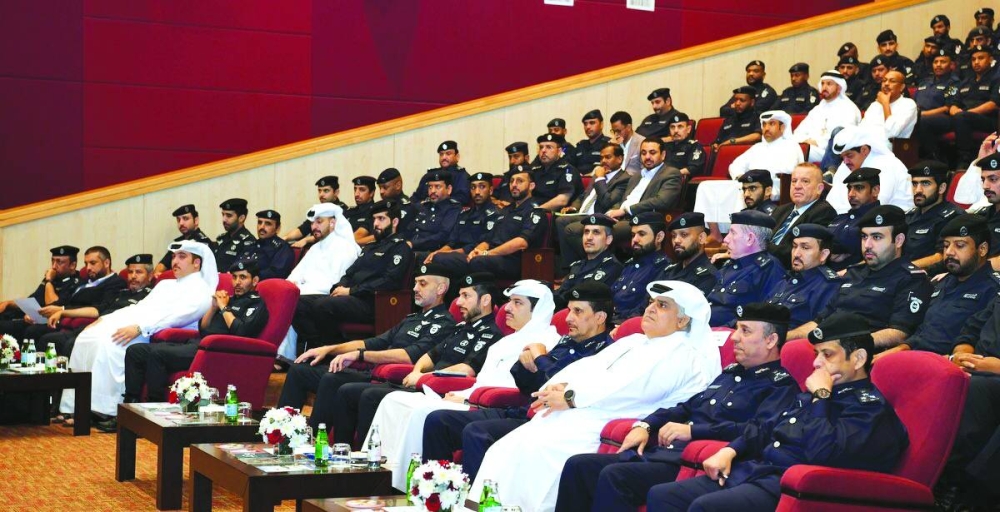The General Directorate of Traffic held on Monday a workshop on the occasion of the 7th UN Global Road Safety Week, with the participation of a number of other entities.
The workshop focused on sustainable transport, the urgent need to rethink mobility, road network design, and pedestrian protection among other road safety topics.
In his speech, Acting Director General of Traffic Brigadier Abdulaziz bin Jassim al-Thani stressed the importance of the workshop and its topics on enhancing road safety, serving the Directorate's goals and efforts in this regard.
Director of the Traffic Awareness Department Brigadier Dr Mohamed Radi al-Hajri said celebrating the 7th UN Global Road Safety Week comes in light of the great and exceptional efforts put in by all national institutions concerned with traffic affairs in developing road networks, reducing traffic congestion, and enhancing road safety.
He added that these goals are among the priorities of the National Development Strategy and the Qatar National Vision 2030, which seek to achieve the UN Sustainable Development Goals ratified by Qatar.
Brigadier al-Hajri explained that road accident dangers have become one of the biggest challenges facing the world, provoking an international effort to confront these dangers by adopting common measures, procedures, and standards aiming to reduce the number of deaths and injuries caused by traffic accidents, and making roads safer.
Director of the Traffic Awareness Department highlighted the increasing attention of the country's wise leadership on strengthening Qatar's international position in traffic safety, through its continuous support for traffic competent authorities in carrying out their duties in accordance with best international practices, strengthening the traffic safety system in Qatar, preserving its accomplishments, and continuing to work towards reducing the rate of traffic accidents.
He pointed to the recent achievements of the General Directorate of Traffic which are strengthening the role of smart systems in solving traffic jams, improving traffic safety, and reducing traffic violations and road user bad conduct.
Brigadier al-Hajri added that the Directorate created an accurate traffic database in line with international best practices, in addition to developing traffic accident investigation processes to reveal traffic accident causes and to find effective solutions for them, in addition to advocating for traffic safety among all segments of society.
Secretary of the National Traffic Safety Committee Brig Engineer Mohamed Abdullah al-Maliki said the engagement in the activities of the 7th UN Global Road Safety Week aims at emphasising the importance of placing traffic safety rules at the very centre of the efforts, in pursuit of making traffic and movement in the world among the top priorities of countries and their institutions.
He outlined that Qatar's engagement in these activities came to underscore its national responsibilities towards protecting the community and homeland from the risks caused by car accidents, especially pedestrians, drivers, and passengers to provide an environment that assures safe movement for all road users through the synergistic efforts of all entities that oversee the process of maintaining traffic safety in the country.
In addition, Brig al-Maliki asserted that the NTSC has exerted great efforts to improve traffic safety levels and made road safety one of its top priorities, in addition to setting the first national strategy for traffic safety in Qatar to achieve that objective, he added. The strategy has been prepared and implemented by various sectors concerned with traffic safety in Qatar, which is a sector-wide strategy that has been executed during the period from 2013-2022.
HE Director of the Public Health Department at the Ministry of Public Health Sheikh Mohamed bin Hamad al-Thani underlined that traumas arising from car accidents are the major cause of fatalities and incapacitation worldwide. Qatar has however, made great strides in the area of traffic safety in the recent years, such as setting evidence-based policies and strategies, including best practices, such as the Qatar National Road Safety Strategy 2013-2022, to reduce traffic accidents' impact on the community.
Meanwhile, the Medical Director of the Hamad Trauma Center Dr Sandro Rizoli said the centre cares for trauma patients and prioritises the prevention and protection from car accident traumas, pointing out that the centre has a specialised team operating, and outlined that Qatar can succeed in attaining vision zero in accidents and fatalities because it has all elements through which it can be achieved.
Road safety engineer at the Public Works Authority (Ashghal) Eng Abdullah al-Maraghi said Ashghal continues to implement Qatar's infrastructure projects in conformity with the Qatar National Vision 2030 to achieve high levels of safety on the road network, and emphasised that Ashghal works to support NTSC's objectives, along with national traffic safety entities through the wide logistical support.
He asserted that Ashghal prioritises the traffic safety file as one of the critical issues by carrying out the developed action plans and permanently communicating with partners to attain the required result from all, and to achieve the desired traffic safety accordingly. He pointed out that to ensure the safety of road users and to reduce traffic accidents, road networks are designed by taking the most vulnerable persons into account, in co-operation with the planning entities.


